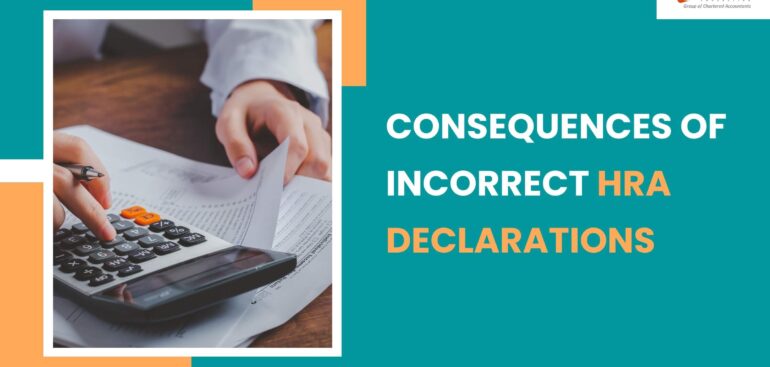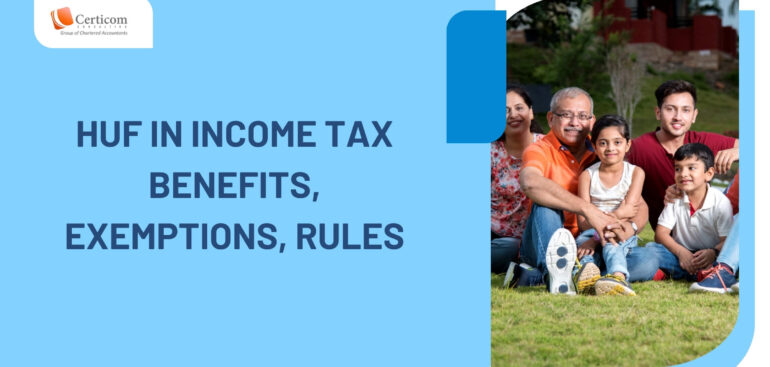Understanding the Consequences of Incorrect HRA Declarations

The income-tax department has discovered between 8,000 and 10,000 high-value cases, each containing false House Rent Allowance (HRA) claims totaling more over Rs 10 lakh.
Rather than the original property owners, taxpayers are claimed to have given PANs of acquaintances, lower-class relatives, and themselves in order to help them pay less in taxes. This is just an intentional attempt to avoid paying taxes.
With the use of data analytics and technical breakthroughs, deliberate tax evading has unavoidable consequences. Actually, it is relatively simple for the tax collector to track down tax evaders and impose penalties and interest.
House Rent Allowance
HRA is a sum of money used to cover costs related to house rent. Under the Income Tax Act, there is an exemption that will cover the lesser of three amounts: the actual rent paid by the employer; 50% of the salary if the rented home is located in a metro area; 40% of the salary if it is located in any other city; and the excess rent paid (10% of the salary).

It is noteworthy that Bengaluru is not classified as a metro city for income tax purposes. Salary is defined as basic pay + commission on turnover, if any, and dearness allowance, if it’s included in retirement benefits, for HRA purposes.
The employee’s PAN must be submitted in order to claim tax exemption on behalf of the property owner or payer of the rent. After taking the HRA allowance into account, the employer will deduct appropriate tax at source. Furthermore, in their respective returns, the employer and employee must include the property owner’s PAN.
In addition, legitimate rental agreements, rent receipts, and bank statements for rent payment must be produced by taxpayers. Before complying with TDS regulations and subjecting rent recipients to tax, employers must perform reasonable verification.
Ways to handle a HRA notice?
The taxpayer has to respond to the notice by submitting the proper paperwork online within the allotted period after receiving it. The ability of an employee to claim HRA for rent paid to parents or other family members is unaffected by law. If there isn’t a rental agreement or cash payments made instead of bank transfers, the department might investigate the matter.
The agency will require the taxpayer to file a new return with or without claiming any applicable deductions and exemptions if they do not hear back from them. The Income Tax Act’s Section 272A(2) states that noncompliance with a notification may result in penalties of up to Rs 100 per day.
Additionally, there is a 12% annual penalty for underreporting income or claiming an incorrect deduction or exemption.
There is also a chance of prosecution.
In addition, the taxpayer has the option to proactively make corrections through an updated return, mostly avoiding the disadvantages mentioned above. The deadlines are March 31, 2025 for the financial year 2021-22/assessment year 2022-23 and March 31, 2026 for the FY2022-23/AY 2023-24.

On the e-filing website, a taxpayer can rely on a Tax Information Statement (TIS), Annual Information Statement (AIS), and Form 26AS. They can notify the authorities, take the appropriate action, and prevent any negative outcomes if they discover that someone is paying them rent without receiving the actual payment or that there is no such relationship with the other.
It has been made clear by the Central Board of Direct Taxes that no special effort is being made to reopen these cases. In a limited number of circumstances, the aforementioned action was done. In the coming days, a larger-scale exercise of this kind may be possible because the department has discovered a new method of tax avoidance. Therefore, the only alternatives available to taxpayers are to continue filing taxes on time and to save all tax-related records for a minimum of eight to ten years.
Related Post
Understanding the Consequences of Incorrect HRA Declarations
Understanding HUF in Income Tax: Benefits, Exemptions, and Rules
Filing Income Tax Returns Including Foreign Income
Book A One To One Consultation Now For FREE
How can we help? *










